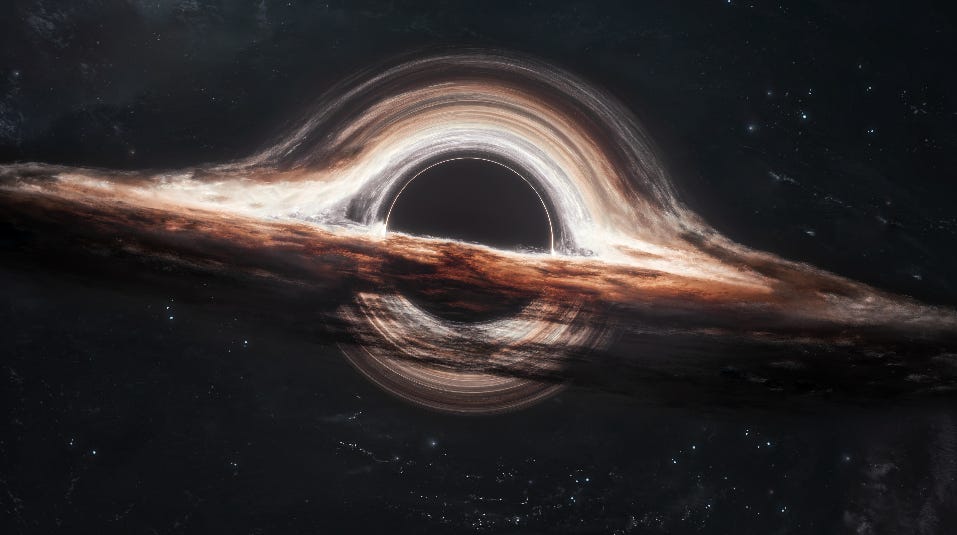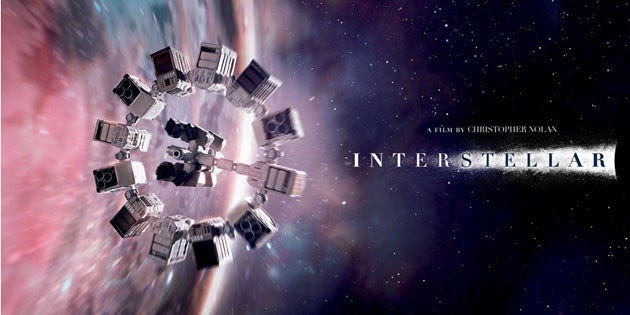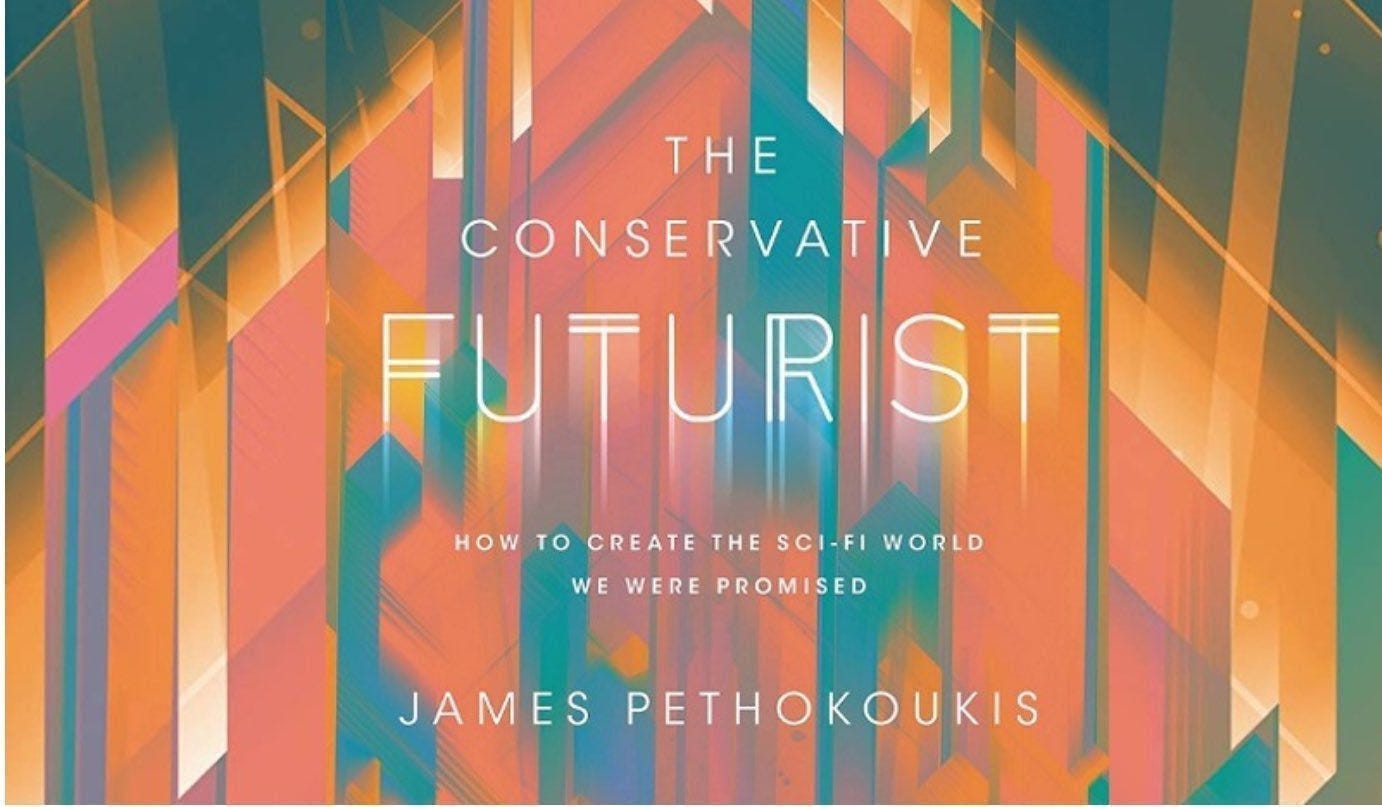🌌 Why 'Interstellar' is an Up Wing masterpiece
'Our greatest accomplishments cannot be behind us because our destiny lies above us'
Trust me, I don’t need much reason to write about Interstellar, which might not only be director Christopher Nolan's best film (co-written with Jonathan Nolan) but also the best consciously pro-progress, Up Wing film ever made. That said, I do have a handy news hook here: Interstellar exceeded industry expectations during its recent 10th anniversary IMAX re-release — I saw it a few weeks ago in a packed theater — earning $8.5 million domestically from a limited number of theaters. The movie has been re-released worldwide in various formats to mark the occasion, generating a total of $21 million in additional box office revenue this year.
Now, I get why some people find Interstellar to be dystopian, while also conceding that it’s impressive, immersive filmmaking, both visually and sonically. A blight of unspecified origin is killing Earth’s vegetation — farmers are pretty much down to corn — a plague that will eventually starve and then suffocate humanity. It’s the sort of environmentally-themed, apocalyptic premise hardly unfamiliar to movie audiences of the past half century, from Soylent Green and Silent Running in the 1970s to most recent films such as WALL-E and The Day after Tomorrow. (Another great example is last year’s Extrapolations, a star-studded Apple TV+ anthology series about a future climate-change dystopia.)
Given that Down Wing premise, you might think that old-school, scarcity-embracing environmentalists would love Interstellar, but you would be mistaken. They dislike how the film doesn’t directly blame humanity and modern industrial society for the blight. Nor does Nolan offer lectures about how politicians and business leaders ignored climate change activists … until it was too late! And no anti-capitalist rants from the hero about consumerism run amok.
Environmentalists really hate this chunk of dialogue from astronaut-turned-farmer Cooper (played by Matthew McConaughey) speaking to his elderly father-in-law (John Lithgow):
We’ve forgotten who we are, Donald. Explorers, pioneers. Not caretakers. … We used to look up and wonder at our place in the stars. Now we just look down and worry about our place in the dirt. … We farmers sit here every year when the rains fail and say ‘next year’. Next year ain’t gonna save us. Nor the one after. This world’s a treasure, Donald. But she’s been telling us to leave for a while now. Mankind was born on Earth. It was never meant to die here.
See, Interstellar isn’t a film about humanity ruining its planet through ecological manslaughter. The film really doesn’t care about what exactly caused the blight, which is really just a mechanism for putting humanity in danger.
My interpretation: Interstellar portrays a Down Wing world where we gave up trying to prepare for the future even though it’s always been technological progress that makes us most resilient as a species. (As political scientist Aaron Wildavsky writes in Searching for Safety, “Resilience is the capacity to cope with unanticipated dangers after they have become manifest, learning to bounce back through economic growth and technical progress. Increased wealth and technical knowledge help us build up a reservoir of resilience for dealing with such problems.”)
Making the blight worse is that we have turned our backs on science, progress, and reason. (Not so hard to imagine given the current denial of manmade climate change, anti-vaccine sentiment, and belief that the Great Pandemic was a hoax concocted by billionaires such as Bill Gates and George Soros.) Down Wing thinking in the world of Interstellar lost us the capacity to deal with existential threats, especially unexpected ones. Cooper is a widower because there were no longer MRI machines that could have detected the cyst in his wife’s brain. Cooper’s daughter is taught in school that the Apollo Moon landing was “a clever PR stunt … a brilliant piece of propaganda. The Soviets bankrupted themselves pouring resources into rockets and other useless machines … And if we don’t want a repeat of the wastefulness and excess of the twentieth century, our children need to learn about this planet, not tales of leaving it.”
Down Wingers on both the Left and the Right might find something in that monologue to hook into.
Upon hearing that teacher’s worldview, Cooper wonders why mankind has stopped striving:
We’ve always defined ourselves by the ability to overcome the impossible. And we count these moments. These moments when we dare to aim higher, to break barriers, to reach for the stars, to make the unknown known. We count these moments as our proudest achievements. But we lost all that. Or perhaps we’ve just forgotten that we are still pioneers. And we’ve barely begun. And that our greatest accomplishments cannot be behind us, because our destiny lies above us.
Up Wing films such as Interstellar play a vital role in shaping our technological future by inspiring innovators and maintaining humanity's pioneering spirit. They also bolster our societal courage in the face of the disruption that inevitably comes with progress. How? By reassuring us a better tomorrow is possible thanks to our sacrifices today. They provide a vision of a future worth fighting for.
Along those lines, please check out two previous essays, “Why optimistic science fiction is still possible and really important” and “Some surprising Up Wing and e/acc films.”
On sale everywhere The Conservative Futurist: How To Create the Sci-Fi World We Were Promised
Micro Reads
▶ Economics
▶ Business
▶ Policy/Politics
A Rift in Trump World Over How to Make America Healthier - NYT
National Science Foundation Hosts Interagency Meeting on Disruptive Technology with UAP in Focus - The Debrief
▶ AI/Digital
Quantum Computers: Getting Real? - Bberg Opinion
Generative AI and Climate Change Are on a Collision Course - Wired
Sam Altman-led nuclear start-up signs major AI power supply deal - FT
OpenAI makes ChatGPT available for phone calls and texts - CNBC
▶ Biotech/Health
▶ Clean Energy/Climate
Climate politics could be about to go into reverse - FT Opinion
We’re Burning More Coal Than Ever Thanks to China - Bberg Opinion
Oklo targets 12 gigawatts of new nuclear power through agreement with data center operator - CNBC
▶ Space/Transportation
Researchers propose building homes on Mars with human blood - Pop Sci
Axiom Space revises space station assembly plans - SpaceNews
Russian space chief says country will fly on space station until 2030 - Ars
▶ Up Wing/Down Wing
▶ Substacks/Newsletters
Why large language models struggle with long contexts - Understanding AI
Your AI Assistant Kit: 12 Practical Tools by Wonder Tools - AI Supremacy
AI in 2025 – The great normalisation - Exponential View
Has There Really Never Been An Energy Transition? - Breakthrough Journal





I love this film. Another good thing about it is that it shows that stories that embrace science and a positive vision of the future don't have to be chilly or unrelatable. Anchoring the plot in the father-daughter relationship gives it tremendous emotional heft.
I don't always agree, but I do share many of the concerns you express here. The book "After World" isn't as far fetched as I might have thought a decade ago.